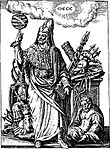
Back أحمد بن علي البوني Arabic Ahmad al-Buni Esperanto Ahmad al-Buni Spanish احمد بن علی البونی Persian Ahmad al-Buni French احمد بن علی البونی Kashmiri Ахмад аль-Буни Russian احمد بن علی البونی SKR احمد بن علی البونی Urdu

| Part of a series on |
| Hermeticism |
|---|
 |
Sharaf al-Din, Shihab al-Din, or Muḥyi al-Din Abu al-Abbas Aḥmad ibn Ali ibn Yusuf al-Qurashi al-Sufi, better known as Aḥmad al-Būnī al-Malki (Arabic: أحمد البوني المالكي, d. 1225), was a medieval mathematician and Islamic philosopher and a well-known Sufi. Very little is known about him. His writings deal with 'Ilm al-huruf (Arabic: علم الحروف, the esoteric value of letters) and topics relating to mathematics, siḥr "sorcery", and spirituality.[1][2] Born in Buna in the Almohad Caliphate (now Annaba, Algeria), al-Buni lived in Ayyubid Egypt and learned from many eminent Sufi masters of his time.[3] A contemporary of ibn Arabi,[4] he is best known for writing one of the most important books of his era; the Shams al-Ma'arif, a book that is still regarded as the foremost occult text on talismans and divination.
- ^ B. G. Martin, Muslim Brotherhoods in Nineteenth-Century Africa, Cambridge University Press, 2003, p.149
- ^ Dietrich, A., “al-Būnī”, in: Encyclopaedia of Islam, Second Edition, Edited by: P. Bearman, Th. Bianquis, C.E. Bosworth, E. van Donzel, W.P. Heinrichs, p. 149
- ^ By C. J. Bleeker, G. Widengren, Historia Religionum, Volume 2 Religions of the Present, p.156,
- ^ Vincent J. Cornell, Realm of the Saint: Power and Authority in Moroccan Sufism, University of Texas Press, 1998, p. 221
© MMXXIII Rich X Search. We shall prevail. All rights reserved. Rich X Search